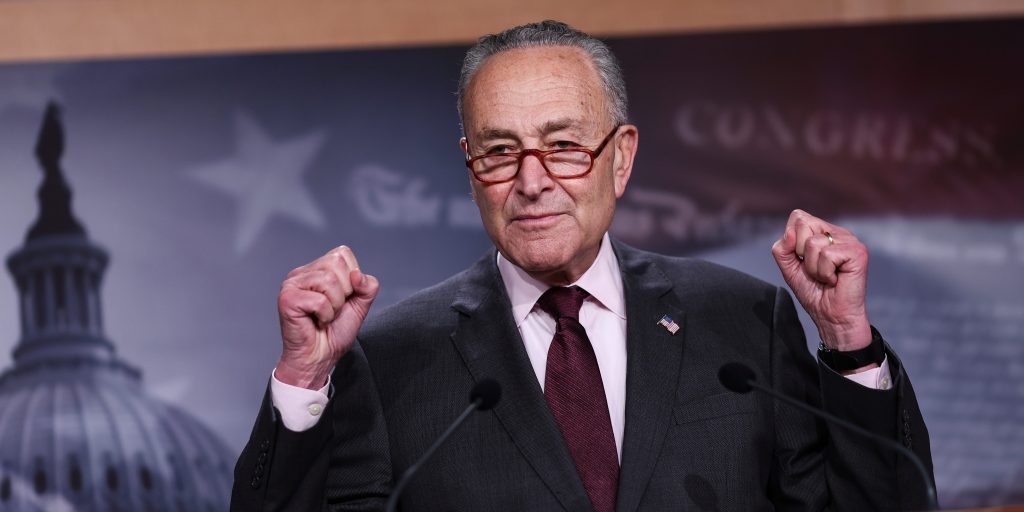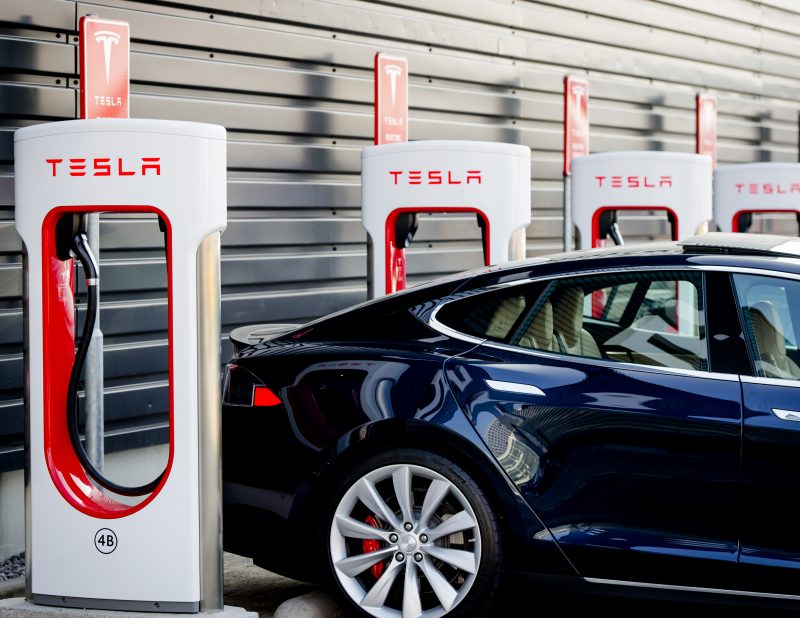- Senate Democrats passed their party's major economic plan Sunday afternoon.
- The House is now expected to vote on the resurrected version of Biden's economic agenda on Friday.
- Not a single Senate Republican supported the measure.
Senate Democrats passed their $740 billion climate, healthcare, and tax package on Sunday afternoon, bringing the party one step closer to delivering on their biggest domestic legislative achievement yet.
The vote was split 50-50 with Vice President Kamala Harris casting the tie-breaking vote. Sens. Joe Manchin of West Virginia and Kyrsten Sinema of Arizona, a pair of longtime holdouts on the party's economic and social agenda, threw their support behind the bill.
"It's been a long tough and winding road," Senate Majority Leader Chuck Schumer said before the final vote. "The time has come to pass this historic bill."
"Here's what's on offer: reducing health care costs, reducing climate emissions, reducing energy costs and reducing the number of wealthy tax cheats," Sen. Ron Wyden of Oregon, chair of the Senate Finance Committee told Insider. "That's what we set out to do."
Democrats beat back a barrage of GOP amendments on immigration, taxes, and energy aimed at altering the bill in a 14 hour marathon voting session. Democratic senators ultimately banded together to shield the package from any provisions that would jeopardize its fragile support. In addition, Sen. Bernie Sanders of Vermont also introduced amendments on prescription drug negotiations and reinstalling the enhanced child tax credit that Democrats shot down.
However, Senate Republicans were successful in stripping a $35 federal limit on insulin costs for Americans carrying private health insurance. The provision establishing a cap on insulin costs for Medicare beneficiaries was left untouched.
But there was a holdup when Sinema considered backing a rival GOP amendment from Sen. John Thune intended to set up a carveout for private equity subsidiaries from the 15% corporate minimum tax. Manchin was opposed to it, per a person briefed on the negotiations. Sinema, Manchin, and Thune eventually struck a deal that included it.
The package was drafted between Schumer and Manchin over the course of two months that saw the secretive negotiations collapse, nearly sounding the death knell for the Democratic agenda. But Manchin backtracked and struck a surprise deal in late July on a measure much larger than many Democrats thought possible.
The 755-page bill would empower Medicare to negotiate the price of some prescription drugs, establish $370 billion in clean-energy tax credits, and extend financial assistance so a larger set of Americans can purchase health coverage under the Affordable Care Act for three more years.
It's paid for with a 15% domestic minimum tax on large, profitable corporations paired with a 1% excise tax on stock buybacks. It sets aside $80 billion for stepped-up IRS enforcement and is projected to shrink the federal deficit by $300 billion.
It caps a turbulent stretch for Democrats, who labored and often struggled to secure pieces of Biden's domestic agenda that were unveiled in spring 2021. Biden started out his presidency laying out a two-part plan to strengthen the nation's physical infrastructure and social safety net for families.
Senate Democrats later pursued a $3.5 trillion spending blueprint, but quickly crashed into resistance from the moderate wing of the party. The party employed budget reconciliation to approve the bill, a maneuver allowing them to sidestep GOP resistance with only a simple-majority, plus Harris's tie-breaking vote. But that means Democrats always had few votes to spare in the House and none in the Senate.
Manchin and Sinema quickly rejected that amount in federal spending, setting off a prolonged back-and-forth that tested their narrow majorities through the fall. Democrats struggled to understand the pair's specific demands for the bill.
Manchin later killed the $2 trillion House-approved Build Back Better Act in December, arguing he didn't want to worsen inflation. Democratic efforts to revive a smaller bill subsided in the spring until Schumer started meeting with Manchin on scaling back the measure.
But it required Democrats to make painful concessions on many of their major social priorities. The package does not extend the Biden child tax credit that once provided monthly checks to families. It also ejected affordable childcare, a national paid and medical leave program, and affordable housing among other initiatives.









